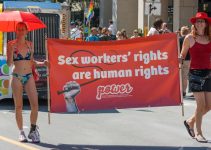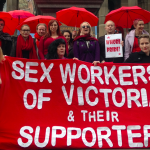South Australia Set to Decriminalise Sex Work

South Australia currently has some of the most repressive sex work laws in the country.
However, a bill that passed through the South Australian upper house on July 6, has brought the decade’s long push to decriminalise the state’s sex work industry one step closer.
The Statutes Amendment (Decriminalisation of Sex Work) Bill was initially tabled before the SA Legislative Council by state Liberal MLC Michelle Lensink in 2015. At the time, the legislation was sent to a parliamentary select committee for review.
After receiving 87 written submissions and conducting a tour of brothels in SA and also NSW, the committee tabled their report on March 31 this year, recommending that the legislation continued through state parliament without any amendments.
Clearing that upper house hurdle
SA Labor MLC Tung Ngo introduced eight last minute amendments to the legislation, which looked set to stall the bill proceeding. Mr Ngo was one of the members of the select committee who opposed the final recommendation of the report.
However, the Labor minister’s amendments were voted down, and the bill passed through the upper house on a conscience vote – 13 to eight – in a debate that went past midnight.
The campaign to decriminalise the South Australian industry began as far back as 1980 with the introduction of the Millhouse Bill. That was followed by the 1986 Carolyn Pickles Bill. And over the past 20 years, there have been a total of twelve attempts to introduce a sex work reform bill into parliament.
What makes the current legislation so significant is that the former bills that actually made it to a parliamentary vote were voted down in the upper house. Indeed, this is the reason why the members behind the new bill initially tabled it before the Legislative Council.
The Swedish model
The Australian Catholic Lobby opposed the decriminalisation bill and were calling for implementation of the Swedish model. It criminalises those who pay for the services of sex workers, but not sex workers themselves.
However, this model has been condemned by sex worker rights advocates globally, as it actually maximises harm to sex workers and their families, as well as leads to police targeting sex workers, when they’re investigating third parties.
“The sex workers say that they feel incapacitated by the state and not respected,” Swedish feminist writer Petra Östergren wrote in a 2003 paper on the impact of the Swedish model in her country. “They maintain that their rights as citizens are violated.”
A world first
The SA sex industry reform bill has been described as the “first full decriminalisation bill in the world.” And if it is passed through the lower house of parliament in its current form, it would actually establish the most completely decriminalised sex work industry on earth.
At present, NSW and New Zealand are the only regions in the world to have decriminalised the sex industry. However, when reform legislation was passed in both those jurisdictions, amendments were made to the originals bills, which led to certain situations continuing to be classified as criminal.
Accessing police services
Sharon Jennings, manager of the South Australian Sex Industry Network (SIN), said that if the bill does make it through the House of Assembly “it will revolutionise the industry in South Australia.”
“It will mean that relationships between sex workers and police can actually start to be built,” Ms Jennings explained. “Because they’re fractured now.” She said that at present sex workers are reluctant to report a crime that has been committed against them.
The minute that you do report a crime “you’re recorded on their register as being a sex worker, and that has ongoing implications for you,” Ms Jennings told Sydney Criminal Lawyers®. “There’s also the fear that you actually will be prosecuted for doing sex work in the first place.”
Under current South Australian laws, sex workers still face the possibility of being imprisoned, and they can be issued with fines of up to $2,500 for living off the earnings of sex work.
By sex workers for sex workers
SIN is a peer-based non-government organisation that receives some funding from the state government via the Communicable Disease Control Branch of SA Health.
The group provides peer support and education, as well as an outreach program to brothels and street-based workers that includes health promotion. However, the current criminalisation of the industry has led to their workers being restricted from entering brothels.
“Because we’re partially government funded there’s this misconception that we’re actually passing information onto the government, which, of course, we’re not,” Ms Jennings explained.
According to Jennings, what this actually means is that sex workers “are scared of taking resources” from outreach workers, and they’re even concerned about “having excess condoms on them, because it’s all been used as evidence of sex work in the past.”
The decriminalisation of the NSW sex work industry in 1995, led to the improved health and well-being of sex workers. It also led to low rates of HIV and other sexually transmissible infections. And today, condom use within the industry is almost at 100 percent.
Surpassing the NSW industry
Ms Jennings believes that the reform legislation has the potential for a fully decriminalised sex work industry to be realised in South Australia.
“Our bill is slightly different to the one in NSW,” she explained. “There’s an amendment in the NSW legislation where street-based sex work can only occur in Kings Cross.” The SA legislation has no restrictions as to where street-based sex workers can operate.
“If there are any caveats, it opens the door for corruption,” Ms Jennings continued. “Because you can then be arrested for just walking down a street that’s not designated for street-based sex work. So we don’t want that caveat in.”
Chief executive of the Scarlet Alliance Jules Kim told the Wire that amendments made to legislation in NSW and New Zealand actually led to some of the most marginalised sex workers being targeted. In NSW that was street-based workers, whereas in NZ, it led to restrictions for migrant sex workers.
The final hurdle
It’s still uncertain as to when the bill will undergo its final vote in the SA lower house. But the government is hoping this will be soon, as they would prefer the ruling on such a contentious issue to be well underway before the state election in March next year.
Ms Jennings said that it’s now time for her organisation “to contact each individual member and start lobbying” for the legislation to pass in its current form. As for the support of the general public, she believes it’s “pretty good.”
Indeed, decriminalising the sex industry will “mean more money coming into the economy,” Ms Jennings concluded. “Because, of course, everybody is going to have to register their business and pay the appropriate taxation… just like they do in any other business.”
Receive all of our articles weekly
Author

Paul Gregoire






